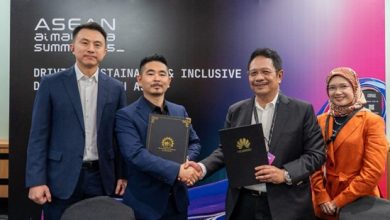Fulfilling The Promise of a Digital Future For All

By Oliver Liu, Vice President of Huawei Technologies (Malaysia) Sdn. Bhd.
 Like it or not, the world is undergoing a massive transformation, which was accelerated when COVID-19 announced its presence. Digital transformation became a necessity with lockdowns and working from home turning this into a newfound reality.
Like it or not, the world is undergoing a massive transformation, which was accelerated when COVID-19 announced its presence. Digital transformation became a necessity with lockdowns and working from home turning this into a newfound reality.
To reap the full benefits of the digital economy, expanding the digital talent pool became a necessity. The buzzword of the moment then and now was “digitalisation” and everyone wanted to jump on the bandwagon and ensure they had a piece of the pie. Then came the realisation that there isn’t enough digital talent in the region.
There is an urgent need for a talent development ecosystem to be put in place that will address the shortage of digital skills and prepare the next generation of digital talents. This cannot be done in silos. There must be industry, Government and academia tie-ups for a holistic sustainable and inclusive learning ecosystem.
I.C. THE FUTURE
Huawei’s vision is to “bring digital to every person, home and organisation for a fully connected, intelligent world.” Therefore, we continue to push boundaries to ensure digital inclusion and we walk the talk by investing in training. Huawei aims to provide students with a platform to compete healthily and exchange ideas, thus enhancing their ICT knowledge and practical skills as well as increasing their ability to innovate by using new technologies and platforms.
We have programmes such as our global flagship CSR Programme, Seeds for the Future, with 145 local students participating since its inception in 2014; our ICT Academies in 34 public and private institutions of higher learning in Malaysia and our Huawei ICT competitions that provide students with the experience of competing on an international stage as well as the opportunity to apply knowledge, think on their feet, apply problem-solving skills and increase their confidence. We believe that training provides the foundation but that applying that knowledge and being provided the opportunity to apply it are equally important.
These programmes leverage our decades of ICT experience and expertise to help tackle ICT workforce challenges. We must ensure that digital skills evolve at the same pace as industry opportunities. Mismatches and a glut of talent in a particular expertise must also be avoided. That is why the needs of the industry and the cultivation of talent need to be aligned. Hence, programmes such as the Huawei ICT Academy come into play, which assists in empowering universities to cultivate ICT talent that meets industry requirements through advanced courseware and hands-on training.
Digital Leadership Excellence
While cultivating talent is crucial, equally important is the upskilling and cross-skilling of existing talent. Hailing the call from Malaysian Prime Minister Dato’ Seri Anwar Ibrahim during his closing address at the Malaysia ICT Summit organised by Huawei in September last year, Huawei Malaysia and the Malaysian Communications and Multimedia Commission (MCMC) are embarking on a training programme for the C-suites and upper management across the public and private sectors to ensure they are up-to-date with the latest advancements in the ICT arena.
Named “Digital Leadership Excellence’, the programme aims to empower change from the top down, targeting business leaders, senior managers and future digital leaders as trainees. The initial target number of trainees for the Programme, which spans over three years, is 300 with 50 trained this year, followed by 100 the following year and 150 in 2026. The training will also encompass a one-month attachment stint with Huawei, a capstone presentation and a two-week industry visit to China.
With sustainability and carbon neutrality an important focus and target for the nation, nurturing, training, upskilling and reskilling green talent should also be of utmost priority. That is why green tech will also be a part of the syllabus for the Digital Leadership Excellence programme.
Huawei Malaysia also works with the Centre of Technology Excellence Sarawak (CENTEXS) to train and develop local talents to support growth in the clean energy industry. These skills are required to build a sustainable and environmentally responsible future. Talents with a combination of these skills can address environmental concerns, decrease our environmental footprint and contribute to a more sustainable and environmentally conscious Malaysia.
Huawei Malaysia, through the Huawei ASEAN Academy, has also pledged to train 50,000 ICT talents over the course of five years, beginning in 2020, with over 48,000 talents trained thus far. Inclusivity has always been a key factor for us and we also work with the Women Leadership Foundation to train the digital talent pool in the country and to help contribute towards the progress of the development of the women workforce and leadership.
Interlinked
Digital talents are the key enablers for digital readiness, ergo, the digital transformation of a nation. All these are interlinked. For example, ICT infrastructure is key to attracting as well as retaining digital talents. Without digital talents to develop applications, telecom infrastructure investments will be wasted.
That is why the ecosystem is emphasised. The balance between the industry, Government and academia is fluid and will continually be subject to change. The question will no longer be about the right talent with the right capabilities, but the right talent with the potential to learn new capabilities; be agile enough to adapt to new changes, be able to continuously grow and be able to adapt to new scenarios.
What we need is a holistic digital talent system which not only caters to training, reskilling, cross-skilling and upskilling but also one that takes into account the needs of an ever-evolving industry. This can only be accomplished via a collaboration between industry-Government-academia for professional competence standards for digital talent to be drawn up that guide the development of academic and continuing education courses.
Only then can we chart the paths and find the pilots to fly into our digital tomorrow.




